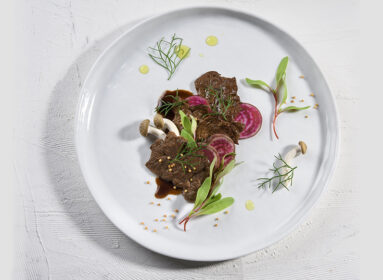
An award-winning chef documents his search for – and his love of – Israeli cuisine
By Cindy Mindell
Many people are surprised to learn that Israel has one of the most dynamic food scenes in the world. They think Israeli cuisine is falafel and hummus, or Jewish food like brisket and blintzes. The reality, as told in a new film by Roger Sherman, is much more complex.
 Award-winning chef, Philadelphia restaurateur, and cookbook author Michael Solomonov is the subject of “In Search of Israeli Cuisine,” a mouth-watering cinematic portrait of Israel told through its rich array of food. The film follows the Israeli-born and Pittsburgh-bred Solomonov to all corners of Israel, profiling top chefs, home cooks, farmers, vintners, bakers, brewers, chocolatiers, street foodies, and cheese artisans drawn from the more than 100 cultures that make up Israel today. Shot on locations from open-air markets to restaurant kitchens and home dining rooms, on farms, olive groves, vineyards and kibbutz fields, a rich, complex human story emerges.
Award-winning chef, Philadelphia restaurateur, and cookbook author Michael Solomonov is the subject of “In Search of Israeli Cuisine,” a mouth-watering cinematic portrait of Israel told through its rich array of food. The film follows the Israeli-born and Pittsburgh-bred Solomonov to all corners of Israel, profiling top chefs, home cooks, farmers, vintners, bakers, brewers, chocolatiers, street foodies, and cheese artisans drawn from the more than 100 cultures that make up Israel today. Shot on locations from open-air markets to restaurant kitchens and home dining rooms, on farms, olive groves, vineyards and kibbutz fields, a rich, complex human story emerges.
Born in 1978 to an Israeli father and American mother in Moshav Ganei Yehuda in Israel, Solomonov was three when his family moved to Pittsburgh and then returned to Israel 13 years later. Solomonov came back to the U.S. at age 17 and moved again to Israel when he was 19. With no Hebrew-language skills, he took the only job he could find – working in a bakery, the one-year stint that would shape his professional path. He would go on to graduate from the Florida Culinary Institute and then move to Philadelphia, where he worked in several restaurants before opening a Mexican restaurant with business partner Steven Cook.
In 2003, when Solomonov was 25, his younger brother, David, was killed by Hezbollah snipers near the Lebanese border, just three days before completing his service in the IDF Golani Brigade. The tragedy served as a turning point for Solomonov, who began to explore Israeli cuisine and in 2008 opened Zahav, a high-end Israeli restaurant in Philadelphia, together with Cook. The duo currently owns and runs five restaurants in Philadelphia and in 2015 co-authored the New York Times–bestselling cookbook, Zahav: A World of Israeli Cooking. They plan to open a branch of their Dizengoff hummus restaurant in New York City later this month.
A 2011 James Beard Award winner for “Best Chef, Mid-Atlantic,” Solomonov has been recognized by the New York Times, Bon Appétit Magazine, Food & Wine Magazine, Esquire Magazine, Condé Nast Traveler, and Travel + Leisure. In 2014, he was named National Chef of the Year by Eater, whose restaurant editor, Bill Addison, hailed him as “the genius of modern Jewish cooking.”
Solomonov met Roger Sherman when the filmmaker visited Zahav to discuss the culinary film. “He said, ‘Do you want to come?’ and I said, ‘That’s my dream; let’s do it,’” Solomonov recalls.
The chef and the filmmaker will present “In Search of Israeli Cuisine” at the Hartford Jewish Film Festival on Monday, April 4 at the Mandell JCC in West Hartford, preceded by a kosher dinner buffet of Zahav recipes and followed by a Q&A.
Recently, Solomonov spoke with the Ledger about the evolution of the oldest-newest cuisine in the world.
Q: You did not start out as a chef of Israeli food. What was your original culinary focus and why did you switch tracks?
A: My focus was European – I was really into French and Italian – and a lot of things happened: I started visiting Israel not only as an Israeli or because of my family but as a chef. When you travel through that land as somebody who’s very creative about food, it’s huge. At the time, there wasn’t that much talk about Israeli food beyond hummus, but you find all these little cultures, little slices – whether it’s the sabikh sandwich [pita stuffed with fried eggplant and hard-boiled eggs] as it relates to the Iraqi immigrants; the Yemenite jachnoon [rolled dough, hard boiled eggs, and spicy tomato salsa] served on Saturdays – there are so many examples of why that country is so great from a culinary perspective and I became privy to that because I started going back and eating all over the place. I was so interested in the food.
Even the layman in Israel understands and appreciates the diversity. Everybody understands the history and geography of where people come from because it’s there at their Shabbat table every week. Their parents aren’t from the same part of the world or their grandparents aren’t from the same part of the world. Their friends are different, but they’re all Jews; they’ve all been brought to Israel over the course of a few hundred years. If they weren’t Jerusalemites, they brought all these traditions from the diaspora.
It affects every part of their lives, whether they’re interested in it or not. They understand that their bubbe (Yiddish for ‘grandmother’, makes really good kreplach and their safta (Hebrew for ‘grandmother’) makes really good couscous – it’s ingrained in Israel, it’s part of the mosaic or the tapestry that makes up Israel.
[Another reason for my switch in focuse was that] my brother passed away and that gave me another reason to get close to Israel.
Q: How would you define Israeli cuisine?
A: There are three main elements to Israeli cuisine. There is the style of eating in the Middle East – sharing, small plates, vegetable-forward, cheese-making, primal cooking using a wood-burning oven and charcoal grill – which is kind of the most superficial element. And then there are all the people that make up Israel, all the people that have been there forever and all the Jews who have moved back over the last few hundred years, from every country in the Middle East, plus Europe, the Balkans, Spain, North Africa, the eastern Mediterranean, Ethiopia, all of the Soviet Union, Central Europe. You’ve got all of those food traditions, and Jewish cooking in those countries is different from the general cooking in those countries. A Jewish cook in Yemen cooks differently than a non-Jewish cook in Yemen; the same thing in Morocco. Kashrut and dietary laws and having to cook for Shabbat have shaped the way the Jews cook and therefore shaped Israeli cuisine. The third element, which is super-important, is that Israel is located basically where primitive and modern agriculture started, and where wine-making started. The Mesopotamian peninsula is where farming happened. The land was prized and agriculture developed there. In recent times, the technology has been honed and super-modern agriculture is practiced there.
In addition to all these cooking traditions and cultures and different influences that make up Israeli cuisine, it’s also a place where tomatoes grow year-round, where the topography is totally different from the north to the south, so you’ve got different things growing, different cycles of things, animals grazing, fish in the Mediterranean, wild herbs growing absolutely everywhere. It’s also part of major trade routes. So the spice trade has gone right through Israel as well.
I think the thing about Israel is that it’s always evolving in every sector, including cuisine. For proper evolution, we need to respect the origins of all these ideas and in Israel, because things are in some ways so traditional and in some ways so progressive, you always have that frame of reference, so the integrity of all these original dishes is always there, which is important. At the time of the Second Temple, everyone cooked the same, and then after that, there was “fusion.” They had to adapt and change and customs changed and cooking certainly changed too.
Q: In the film, some say that there is no such thing as Israeli cuisine – at least not yet — because modern-day Israel is so young. What do you think of this perspective?
A: I think that’s crazy; it’s like saying that there’s no such thing as Israel. What is American cuisine, then? America is only a few hundred years older than modern-day Israel and Israel has more history than America, so what is American food? Do you say that Italian food is not pasta because Marco Polo took that from the Chinese?
I think a lot of people are focused on saying that Israeli food is just Arab food. I say, no, 20 percent of the country is Arab and you can’t deny that and it’s a huge part of the cuisine and Arab food is awesome.
But my grandmother is from Bulgaria; her family went there from Spain after the Inquisition and they brought with them laminated dough, which they called “Spanish dough,” and they used that to make bourekas [savory pastries]. The Ottomans came into Bulgaria, just like they did everywhere, and controlled the country. The Bulgarians revolted against the Ottomans and took Russian names because the Russians helped them arm themselves. So my grandmother’s last name changed from Bakhar to Solomonov. Luckily, during the Holocaust, the Jews of Bulgaria were all protected by the king and were spared. After World War II, they all moved to Israel and they brought the dough with them and now bourekas are sold on every street corner. They’re synonymous with Israeli food; you don’t see them anywhere else. The moment my wife and I land in Israel, the first thing we do is get a bag of piping-hot bourekas and pickles and hard-boiled eggs and that’s our breakfast. Tell me that that’s not Israeli cuisine – it is. It’s silly to me that people say that Israeli cuisine doesn’t exist; it’s deprecating or invalidating.
It may be the way that it’s marketed. Everyone says that shakshouka is Israeli. The dish came from Morocco and it’s got a different name in Morocco, and in Spain or Mexico it’s huevos rancheros; but I’ve never heard shakshouka or bourekas or any of these things other than from people from Israel or in Israel.
Dolmades are found in Bulgaria, Greece, and Turkey. Rolling grape leaves and stuffing them with rice or meat is something that, when countries were conquered, was spread, and I’m glad they’re part of Israeli culture as well. It’s just hard to pinpoint where a specific dish comes from because food follows the people. So if dishes end up in other places, you can’t argue with the facts; it doesn’t happen by accident.
That’s what makes food so cool – it goes beyond borders. In the film, I was talking with Chef Erez Kamarovsky about whether something was Israeli food or Palestinian food while he was chopping a tomato and he said, “Whether it’s an Israeli or a Palestinian cutting the tomato, the tomato does not care.”
A Taste of Israel… in West Hartford
 “In Search of Israeli Cuisine” will have its New England premiere at the 20th Annual Mandell JCC Hartford Jewish Film Festival on Monday, April 4, 7 p.m. in the JCC’s Herbert Gilman Theater. The screening will be followed by a Q&A session with Chef Michael Solomonov and the film’s director, Roger Sherman, as well as a book signing.
“In Search of Israeli Cuisine” will have its New England premiere at the 20th Annual Mandell JCC Hartford Jewish Film Festival on Monday, April 4, 7 p.m. in the JCC’s Herbert Gilman Theater. The screening will be followed by a Q&A session with Chef Michael Solomonov and the film’s director, Roger Sherman, as well as a book signing.
The screening will be preceded at 5:30 p.m. by “Zahav A La Carte,” a dinner buffet at which those attending will have the opportunity to meet Solomov and Sherman. Catered by Margery Gussak Catering, the dairy dinner is strictly kosher, under the supervision of the Hartford Kashrut Commission. It will feature recipes from Solomonov’s new book, Zahav: A World of Israeli Cooking – including an assortment of hummus, bourekas, salads, desserts and more. There will also be a “shuk” where film-goers can scoop an assortment of nuts, dried fruits and chocolates into bags to take into the film.
Tickets are $25 and include food and film.
Cookbooks will be on sale, with proceeds benefitting the Anja Rosenberg Kosher Food Pantry at Jewish Family Services of Greater Hartford.
The Hartford Jewish Film Festival opens March 31 and runs through April 10. For tickets and information visit hjff.org or call (860) 231-6316.
In the Israeli kitchen
Michael Solomonov’s new cookbook Zahav: A World of Israel Cooking is filled with fabulous recipes, accompanied by the stories behind them. Here is one.
SHAKSHOUKA
serves 8
 “On a recent trip to Israel, I even had shakshouka at a gas station diner,” says Solomonov, attesting to the popularity of dish he describes as “a simple and quick North African dish of eggs poached in a spicy stew of tomatoes and peppers that packs a punch. It’s a great, large-format brunch dish to feed a crowd. Shakshouka is another great example of a dish that came from elsewhere but is now essential to Israeli cuisine. … This recipe is a very straightforward version, but shakshouka can be bedazzled with all sorts of things, from merger (or any other sausage) to feta or Parmesan cheese. It’s easily scaled up or down depending on your crowd. But the most important question: What kind of bread will you choose to sop up every last drop of sauce?”
“On a recent trip to Israel, I even had shakshouka at a gas station diner,” says Solomonov, attesting to the popularity of dish he describes as “a simple and quick North African dish of eggs poached in a spicy stew of tomatoes and peppers that packs a punch. It’s a great, large-format brunch dish to feed a crowd. Shakshouka is another great example of a dish that came from elsewhere but is now essential to Israeli cuisine. … This recipe is a very straightforward version, but shakshouka can be bedazzled with all sorts of things, from merger (or any other sausage) to feta or Parmesan cheese. It’s easily scaled up or down depending on your crowd. But the most important question: What kind of bread will you choose to sop up every last drop of sauce?”
Ingredients:
1/2 cup olive oil
1 onion chopped (about 3 cups)
4 red or green bell peppers, chopped
6 garlic cloves, sliced
2 tablespoons grated dried lime, optional (available online and in Middle Eastern markets)
6 tablespoons sweet paprika
2 teaspoons ground cumin
2 teaspoons ground coriander
1/2 teaspoon kosher salt
8 cups tomato puree
1 tablespoon plus 1 teaspoon sugar
16 large eggs
Serrano chiles, thinly sliced
Fresh cilantro, chopped
Heat 1/4 cup of the oil over medium heat in a cast iron skillet large enough to accommodate 16 poached eggs. Add the onions bell peppers, garlic, dried lime (if using), paprika, cumin, coriander, and salt and cook, stirring occasionally, until the vegetables have softened but not browned, about 10 minutes. Add the tomato puree and sugar and simmer until reduced by about one-third, 10 to 12 minutes. Whisk in the remaining 1/4 cup oil. Crack the eggs into the skillet, spacing them evenly in the sauce. Lower the heat, cover, and cook until the egg whites are set but the yolks remain runny, about 5 minutes. Top with serrano chiles and cilantro and serve immediately right from the pan.
TWICE-COOKED EGGPLANT
“This is probably my favorite eggplant preparation of all time,” Solomonov. “First, I pan-fry the slices to char and sweeten the flesh, then I cook them again with tons of vinegar. The result is a sweet, sour, and smokey salad. … By taking the eggplant to the edge, you can develop, rich, deep, and almost chocolaty flavors that make this one of the punchiest bites there is. The flavor intensity of the salad makes it a great complement to roasted lamb, and its out of control as a sand addition.”
Ingredients:
2 medium eggplants, cut into thick rounds
2 tablespoons kosher salt
6 tablespoons olive oil
1 cup chopped red bell pepper
1 cup chopped onion
1 tablespoon ground coriander
1 teaspoon sweet paprika
1/4 cup sherry vinegar
1/2 cup chopped fresh parsley
1 tablespoon lemon juice
Sprinkle the eggplant slices with the salt and let stand for 30 minutes on paper towels or a rack. Film the bottom of a large nonstick skillet with oil and set over medium-high heat. When the oil is shimmering but not smoking, and working in batches if necessary to avoid crowding, add the eggplant slices in a single layer. Cook until almost black on the first side, about 10 minutes. Turn and repeat on the other side, adding more oil as needed. Remove the cooked eggplant to a plate. Add 2 tablespoons olive oil, the red pepper, onion, coriander, and paprika to the skillet. Cook, stirring occasionally, until the vegetables are very soft but not brown about 12 minutes. Add the eggplant and vinegar to the pan, breaking up the eggplant and mashing it coarsely with a wooden spoon until well combined. Cook until the vinegar has evaporated about 8 minutes. Off the heat, stir in the parsley and lemon juice. Serve warm or at room temperature.








 Southern New England Jewish Ledger
Southern New England Jewish Ledger










